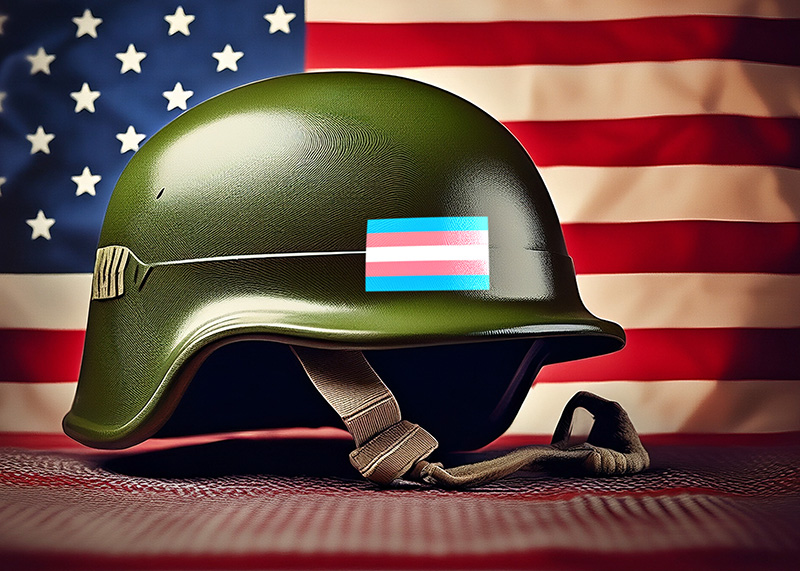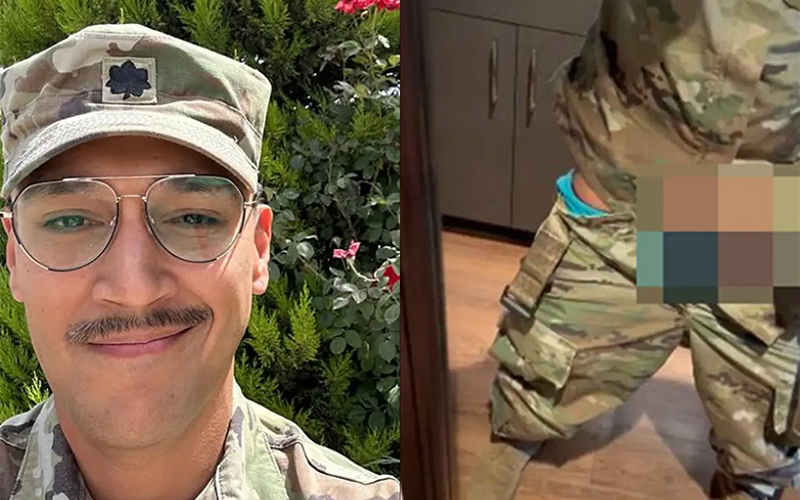Federal Court Strikes Down Pentagon’s Discriminatory HIV Policy
Judge rules that the military cannot discharge service members or deny them commissions due to their HIV status.

A federal judge has ordered the U.S. Department of Defense to stop discriminating against service members living with HIV and allow them to deploy and commission as officers in the U.S. military.
The landmark ruling is the first of its kind to find the Pentagon’s current HIV-related policies to be discriminatory, unconstitutional, and based on outdated science, reflecting the fact that HIV — especially when treated with antiretroviral therapy — is a chronic, treatable condition that does not require special accommodations or interfere with military readiness.
The ruling deals with two cases, Harrison v. Austin and Roe & Voe v. Austin — which were combined for purposes of discovery and argument — in which military members were either threatened with discharge or denied promotions due to their HIV status.
In the first case, Nick Harrison, an openly gay veteran of two overseas combat zones and sergeant in the D.C. Army National Guard, was denied a position in the Judge Advocate General Corps after being diagnosed with HIV due to the Pentagon’s policy classifying service members with HIV as “non-deployable,” meaning they cannot be deployed to military posts outside the United States for more than 12 consecutive months. That policy, established during the early years of the AIDS epidemic in the late 1980s, was based on the idea that HIV was an highly transmissible, untreatable condition ultimately resulting in death — all assumptions that are no longer backed by science.
Despite obtaining supporting documentation and testimony from his doctors that he would be able to meet all the necessary requirements to become a JAG officer, Harrison’s request for a medical waiver was rejected.
The other case involved two anonymous Air Force members, referred to pseudonymously as Richard Roe and Victor Voe, who sued after the Air Force tried to forcibly discharge them on the grounds that their HIV status made them “unfit for military service.” That designation, however, contradicted sworn statements from their commanding officers and personal doctors saying they met all the medical, mental health, and physical requirements to continue serving in the U.S. military.
In February, Judge Leonie Brinkema, of the U.S. District Court for the Eastern District of Virginia, issued a preliminary injunction blocking the Air Force from continuing to move forward with discharge proceedings against Roe and Voe. After the Trump administration appealed the decision, in January 2020, the 4th U.S. Circuit Court of Appeals upheld Brinkema’s preliminary injunction, ensuring Roe and Voe would not be discharged while the case was working its way through the courts.
In ordered issued Wednesday, but placed under seal for a few weeks, Brinkema ordered the Air Force to rescind its decision to discharge Roe and Voe and ordered the Army to rescind its decision denying Harrison’s application to commission into the JAG Corps. She also issued an order blocking the Department of Defense from attempting to discharge or deny advancement opportunities for other asymptomatic service members living with HIV.
Specifically, Brinkema found that the categorical ban on service members with HIV was unlawful because it is at odds with current medical science and treats service members living with HIV differently from others with chronic conditions that require medication during deployment. In her reasoning, she noted — as had the 4th Circuit previously in upholding her injunction — that the latest science proves that the risk of HIV transmission in a deployed setting is essentially nonexistent if service members continue their medication regimen and maintain an undetectable viral load.
Kara Inglehart, a staff attorney for Lambda Legal, said Brinkema’s decision has “broad, sweeping implications” for service members because they cannot be discharged, or denied promotions or other opportunities, if they contract HIV.
Currently, Pentagon policy bars any HIV-positive individual from enlisting the military, but Inglehart noted that Brinkema’s decision — and the rationale behind it — could potentially be used in other cases involving the Pentagon’s HIV policies. Although there is no pending lawsuit from someone denied the chance to enlist in the military due to their HIV status, there is currently a third lawsuit, Deese & Doe v. Austin, brought by two cadets prevented from joining the Navy and Air Force after graduating from their respective service academies due to having contracted HIV while in school.
“The judge decided that the military, the nation’s largest employer, the world’s largest employer, can no longer discriminate against service members who are living with HIV,” Inglehart told Metro Weekly in an interview. “The military can no longer categorically bar people living with HIV from deploying all over the world, including in war zones or from commissioning to become officers, and they can’t discharge people any more just based on their HIV status. … But it has real-life implications for all our clients who will know that their day-to-day service will be as valued as any other service member.”
Scott Schoettes, the HIV Project Director for Lambda Legal, told Metro Weekly that he is hopeful that the decision will encourage the Biden administration to amend Department of Defense regulations regarding potential enlistees’ HIV status. He said the case sets “important precedent” for future cases on the military’s policies related to HIV.
“This decision is the first decision on behalf of people living with HIV that is rooted in the Constitution, and in particular, the Equal Protection Clause, which is significant. I would argue that it’s easier to succeed under the Americans with Disabilities Act, but that does not apply to the military. And so we had to proceed under the Constitution, and that’s a big deal. This ruling shows how strong our arguments were that we were able to succeed under the Constitution,” Schoettes noted.
He added that the case also sends a message about the capabilities of people living with HIV, saying: “There is no job in the world that a person living with HIV cannot safely perform.”

Asked whether the administration might move to revoke pharmaceutical benefits for antiretrovirals under HIV-positive service members’ insurance plans as a “back-door” way of ushering them out of the military, Schoettes rejected the premise.
“First of all, the piece about discharge has never been contingent upon a person’s health, where they are in terms of their HIV. And the military does provide health care to all of its members — and actually provides really good health care,” he said. “So nobody’s talking about taking that health care away from anyone in the military, and, in fact, about 99.8% of service members living with HIV have an undetectable viral load,” Schoettes, estimating the number of service members living with HIV to be around 2,000 in total.
Inglehart said Lambda Legal is hopeful that the Department of Defense won’t try to appeal the decision to the 4th Circuit.
“The decision is really clear and very well reasoned. It also echoes of the 4th Circuit Court of Appeals decision upholding our preliminary injunction in the Roe & Voe case,” she said, noting that both President Joe Biden and Vice President Kamala Harris had campaigned on allowing open service, including by individuals living with HIV. “So we’re hopeful that [the Biden administration] will [examine] their past policy statements and that the Department of Defense won’t appeal here.”
All three plaintiffs expressed gratitude over Brinkema’s ruling.
“I am thrilled to hear that the judge has ruled in our favor, as it would remove barriers for people living with HIV like me in the military,” Richard Roe said in a statement. “When aspiring to join the military, I would have never thought this would happen to me; now, I feel like my service matters even more. I no longer have to live in fear of discrimination based on the simple fact I am living with HIV, especially since it is a treatable condition that poses no real risk to others.”
“I joined this lawsuit because I feel an extreme sense of duty to my country and I wanted to make sure no one has to face this type of injustice, especially in the military,” added Victor Voe. “I would love for this decision to serve as an educational opportunity for millions of people out there to realize that appropriately treated HIV has almost no effect on life expectancy, that science and medicine have progressed to a point that we can live normally and can perform any job, including that of a service member who deploys into a combat zone.”
Harrison told Metro Weekly in an interview that he’s hopeful the case will establish a good precedent for others facing discrimination or discharge because of their status.
“This is a decision based on science rather than stigma. And what it’s basically doing is just laying out what we already know, what everyone in the industry, and everybody in every agency and department throughout the United States government has already said — which is that there are aren’t really any restrictions as far as jobs or duties that you can perform,” he said of his fellow service members living with HIV.
Harrison will continue to be a reservist, serving two weeks a year and one weekend each month for the D.C. National Guard, even if he commissions as a JAG officer. He’ll also have to undergo specialized JAG training for a year. He said he’s unsure of whether he’ll have to reapply, but is eagerly awaiting guidance from the government and his chain of command about what the next steps he’ll be able to take.
“Hopefully, there will be a commissioning ceremony sometime soon in my future,” he said. “I’m looking forward to the opportunity to try to help out my fellow soldiers. I know a lot of us who are sort of similarly situated throughout the military are all looking to move forward with our careers.”
Support Metro Weekly’s Journalism
These are challenging times for news organizations. And yet it’s crucial we stay active and provide vital resources and information to both our local readers and the world. So won’t you please take a moment and consider supporting Metro Weekly with a membership? For as little as $5 a month, you can help ensure Metro Weekly magazine and MetroWeekly.com remain free, viable resources as we provide the best, most diverse, culturally-resonant LGBTQ coverage in both the D.C. region and around the world. Memberships come with exclusive perks and discounts, your own personal digital delivery of each week’s magazine (and an archive), access to our Member's Lounge when it launches this fall, and exclusive members-only items like Metro Weekly Membership Mugs and Tote Bags! Check out all our membership levels here and please join us today!























You must be logged in to post a comment.